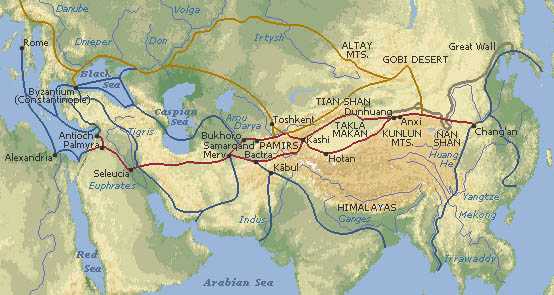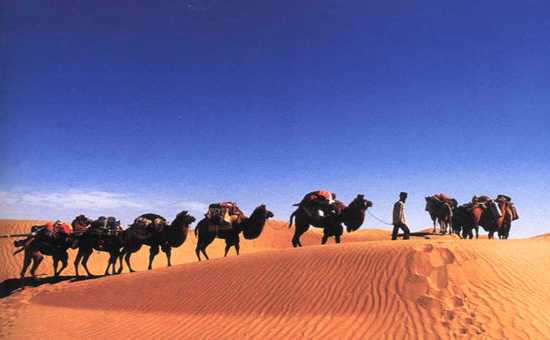Chess in the Caravansaray
The Great Silk Road from its very beginnings more than two millennia ago
this most famous of all ancient trades route has been synonymous with adventure,
mystery and wonder.
Even today, more than five centuries after the last caravan traversed its full
length, the very name invokes time-dimmed images of robed figures and camels
heavily laden with exotic trade goods plodding endlessly through a wilderness
of sand and danger.

"So what?" you would probably think, "Chess has nothing to do
with ancient trade!". And if you thought that, you would be completely
wrong! For more than a thousand years, the 7,000-kilometre route running from
Europe, through the Middle East and Central Asia to China was the information
super highway of its age, serving as the conduit not only for goods but also
for the transmission of knowledge, ideas and culture between East and West both
ways. Although the economic significance of the Silk Road was limited due to
the long distance, its cultural impact was of great significance.
As merchants, artisans, and missionaries travelled along the trade routes,
they brought with them new products, ideas, technologies and culture. And the
game of chess was an inseparable part of that cultural exchange. Actually, all
theories on the history of chess agree that the game originated in one of the
countries of the Road, in either China, India or Persia.

Chess was played everywhere, in royal palaces and merchants' shops, in bazaars
and even on the streets. But the most popular places to play chess were "caravansarays",
large buildings, generally surrounding a court, where a caravan (a group of
travellers journeying together on camels) could rest at night. These relay stations
were constructed all along the Silk Road and were found throughout the Muslim
lands of the Near and Middle East and North Africa.
They were located along main trade routes of the Road at intervals of a day's
journey for a camel caravan. Many were in desolate surroundings but others were
at the gates of towns or within the towns. These structures offered facilities
for the essential needs of the people and the camels of a caravan: a well for
water, a place for the animals to rest, a sheltered area for the unloaded baggage,
rooms for sleeping, kitchen and of course entertainment facilities, including
chess. Chess was mainly a means of entertainment for travelling merchants, but
surprisingly, it was also a nice source of income for some local nimble guys.

A typical caravansaray
When and where do you think first chess "professionals" came into
this world? I guess the first thing that came to your mind is Café La
Regence or the likes in London or Madrid. But again, to explore that, we will
have to go back to Caravansaray era. There is a lot of historical evidence that
caravansarays and other public places of that time were also gambling places.
There were lots of games played for stakes, chess being one of the most popular.
And caravansarays were most favourite places of "chess professionals"
because there were always many rich merchants, an easy prey for them. These
professionals had developed whole strategic systems, scenarios of luring those
rich lamebrains into a game.
Imagine a situation: a caravan arrives at caravansaray, guests are welcomed
and taken to their rooms, baggage unloaded from camels and put into warehouses,
camels are given hay and water, dinner is ready for guests
Now what? Of
course, a merchant who has slept all the way through from the previous caravansaray
will now look for some fun. As he walks around, looking at the architecture
and the artwork of the building, or listening to the nightingale sing in the
cage, he is invited to have a game of chess by a homely, humble person who in
no way looks like a chess expert. Let's call him the hunter and the merchant
the victim, because this is very much like hunting indeed!
Like every novice who has beaten another novice several times, our victim considers
himself the greatest player of all times. He is used to play for small stakes
with his friends and mates. So the game starts, and starts the play, too! The
hunter lets the victim take pleasure of the game for a while, makes simple mistakes,
"blunders", builds simple mating positions for the opponent which
the latter "finds" with a great effort.

This goes on until our hero "wins" three or four games in a row.
While this is going on, the room is filled with amazed spectators and the victim
is drowned in compliments about what a clever guy he is and what a strong player
that he finds these combinations.
Now it's time to perform the second act of the play
The hunter wins the
next game "by pure accident" and is so glad and happy. The victim
believes he is incomparably stronger and just lost the last game by accident.
He now loudly announces it's his debt of honour to offer a stake! The hunter
pretends to be so afraid to play with this strong player, and only agrees to
play for a very small stake, the fee for the dinner for example. Guess who wins
this one? Of course the victim. Next game they play for accommodation fee
A portion of cannabis in hookah
Gradually the stakes rise, the hunter
loses game after game, and is so "excited" and "heated up".
Finally, after having lost all his possessions, he "takes the last chance"
and wagers his golden ring, his "great grandfather's only legacy"
which is, by the way, worth about two hundred times all the previous stakes
put together. Of course, he is "very lucky" in this game as the victim
blunders a rook and a knight
But he still believes he is much stronger
and next time he arrives at the same caravansaray, he will be very happy to
play a rematch and this will happen over and over again, until he realizes what
a silly child he has been!
|
 Jamshid
Begmatov Jamshid
Begmatov
I was born in 1974 in Andizhan, easternmost city of Uzbekistan,
into a family of university teachers. Nothing significant happened during
my school years except, maybe, that I learnt to smoke, drink beer and
vodka, and others useless things. But undoubtedly, one positive thing
I gained from school is the knowledge that then allowed me to enter university,
in the English Language Faculty. However, after completing the first year,
I came to a conclusion that there was nothing left for me to study at
this faculty, and I decided to change my field of study. In 1992 I entered
the University of Istanbul, International Economy. Then, in 1994, for
reasons unknown to me, almost all Uzbek students studying in Turkey were
drawn back to Uzbekistan and placed in different local universities. So
I had to transfer to Tashkent University of Economics, International Economic
Relations, from which I graduated in 1997.
How do you think heavy rain can drastically change someone's
life? That's exactly what happened to me in 1997 summer. I just went out
to have an evening walk in the fresh air when it suddenly started raining.
Well, that was a lucky evening, because there was a pretty girl walking
by near me and she had an umbrella. I politely asked her to share her
umbrella as I was getting wet through to my bones. She agreed. I'm sure
you can guess the end of the story. Today she is my wife, and we have
two nice children, both boys! My elder son is five and is already learning
to play chess.
After graduation I tried several jobs as a civil servant,
wasn't quite happy though. Then I just accidentally happened to participate
in the Soros Foundation's competition for English-Uzbek translation of
a university textbook on Sociology, which I won. I translated several
books since, including Economics, Financial Management, Economics Teacher's
Guide etc. At the present I work as an interpreter for Cambridge Education
Consultants project in Tashkent. However, I view myself as an economist
and since last year I'm conducting my PhD research in Economics. My thesis
is "Economic Globalization and Its Impact on Free Trade Issues in
Uzbekistan".
As a chess player I am not that strong, but I really love
this game. My Elo rating is 2150 (according to Fritz 6). As I have no
human opponents available when I have time, I love playing correspondence
chess via email. Currently I have a number of opponents throughout the
world and would be delighted to play some email games with ChessBase readers
too. Write to me if you are interested (jamshid@fastmail.fm).
|




























